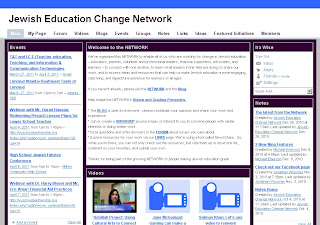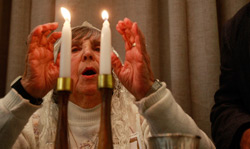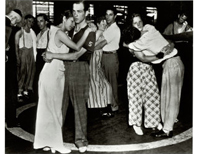 Are you a member of the Jewish Education Change Network? If you are not you should be. Stop. Click on Jewish Education Change Network. Join. Come right back her and finish this post! JECN is the brainchild of Jonathan Woocher and the folks at the Lippman-Kanfer Institute at JESNA. It is a Ning network that serves as a platform for Jewish educators to get together and learn from one another.
Are you a member of the Jewish Education Change Network? If you are not you should be. Stop. Click on Jewish Education Change Network. Join. Come right back her and finish this post! JECN is the brainchild of Jonathan Woocher and the folks at the Lippman-Kanfer Institute at JESNA. It is a Ning network that serves as a platform for Jewish educators to get together and learn from one another.
On March 2, Erica Korman started a discussion forum about Independent Jewish Sunday Schools. I commented and we have gone back and forth a few times and Sara Shapiro Plevan weighed in as well. I thought it was a valuable conversation and I am hoping you will join it http://www.jedchange.net/forum/topics/independent-jewish-sunday and/or here.
Erica Korman is working on her Masters in Education and Jewish Studies Department at NYU:Steinhardt. Sara Shapiro-Plevan is lead consultant for Rimonim consulting.
I invite you to take a look at the Boston-area Jewish Education Program. This is an independent, 4-hour weekly program for 2nd-7th grade that is unaffiliated with any synagogue or denomination and is held (although independent of) at Brandeis University. The BJEP, and others like it, accommodate families that want a Jewish education without the attachment to a synagogue. Many of the children of such families would not receive a Jewish education at all without a program of this type.
My question is this: Is an education discrete from a synagogue a viable option? I think it is great that families that would otherwise not enroll at a supplementary educational program at a synagogue are finding a suitable alternative. However, is Jewish education without clergical (sic) attachment sufficient?
Pros:
Because there are no synagogue dues, the cost is kept low
The teachers are all undergraduate Brandeis students, which offers an energy and vitality not usually found among the traditional Jewish supplementary school
It is a place where families who shied away from denominations and synagogue pressures can find refuge
Cons:
While they advocate learning beyond B'nei Mitzvah, they do not offer post-B'nei Mitzvah education.
Without any denomination, religious praxis may be unclear and potentially confusing. Family guidance from a Rabbi is unavailable because, well, there is no Rabbi.
Perhaps this is too liberal of an option. Is this too deviant from tradition?
 reply by Ira Wise on March 15, 2011 at 11:21 pm
reply by Ira Wise on March 15, 2011 at 11:21 pm
My concern is only tangentially with the lack of clergy. My bigger concern is the lack of community. While I applaud providing for those who cannot or do not wish to find a synagogue home, I fear that this serves to commoditize the Bar Mitzvah in the most cynical way clothed in the guise of serving the disaffected.
Becoming a Bar/Bat Mitzvah should be about a young man or woman beginning to take their place in the adult community. As described, this program seems to be a way to tag the B'nei Mitzvah base without scoring the run. It is another activity ending in a trophy that is not necessarily earned, since there is no stated intention to complete the act - entering the community. This makes Jewish education an activity on par with soccer, the school play or dance class. You enroll, pay, drop your kid off the prescribed number of days per week. At the end the parents attend the recital and celebrate the accomplishment as a family. And when you age out, you move on to another endeavor.
I don't see the advantage of accommodating the "need" to claim connection without actually being connected. The only difference between this and a "faux mitzvah" (covered a few years ago in the NY Times, there seems to be some evidence of non-Jews having a celebration that directly and deliberately mirrors the Bar Mitzvah party) is that the child is actually Jewish. I am open to alternative models. I embrace them. This is not an alternative model. It is Dollar Store imitation of Jewish practice.
 Reply by Erica Korman on March 22, 2011 at 11:37 am
Reply by Erica Korman on March 22, 2011 at 11:37 am
Thank you for your input, Ira. I was initially disturbed by this program. I think any Jewish educational program must have strong, non-compromising boundaries forming it.
Taking a communal rite-of-passage outside of a structured community is a dangerous step. I agree it further commoditizes the Bar Mitzvah, which has long been practiced as a spectacle landmark event in many communities. On the other hand, supporters of this type of program could argue that there is a defined community. It consists of the support from those that are also involved with the school. The other students and families are the kehilla and the principal, or whomever is at the highest leadership position, is the "Rabbi," in this case the adviser and head educator.
It would be great if someone who has experience with this type of organization could provide their input.
 Reply by Ira Wise on March 22, 2011 at 12:32 pm
Reply by Ira Wise on March 22, 2011 at 12:32 pm
My one issue with the idea that this type of school is a community is its transitory nature. It has an expiration date: the end of formal education of the youngest child in a family.
It also lacks a parent modeling component. It has only minimal opportunities - as I see it - for parents to model the behaviors of being part of an adult Jewish community. It makes the focus of Judaism pediatrics.
Metaphor 1: I grew up playing with my grandfather's tzitzit during services. My son grew up playing with mine. Whose will these kids play with?
Metaphor 2: When my parents joined the temple for me to go to Sunday school, they were asked to help out with the lox box fundraiser. They sold a few, but most importantly, on the Sunday in November when they were to be delivered, my father was sitting at a long table behind a scale, weighing lox. He passed the foam plate full of fish to Howie Lipshultz who used a Ronco Seal-a-meal to encase it in airtight plastic. Howie gave it to Sandee Schor who put it in a box with bagels she had bagged, and then passed the box to my mom, who added the onion and tomatoes.
Jump 40 years. We threw my mom a 75th birthday party last summer. Sandee, Howie's wife and a whole bunch of other people who were at that table or others like it over the years were in attendance. My parents modeled community for me and me sister. Many of their most important relationships were and are through the synagogue. No surprise I became an educator. My sister is married to a rabbi. We have very Jewish homes.
You don't need to be a professional to raise Jewish kids. But you have to demonstrate that being Jewish is not kid stuff. It is for adults living and doing adult things in the context of participating in a Jewish community.
One of the biggest challenges in the non-orthodox day school world is enculturating students in the life of a synagogue - essentially being part of a community that doesn;t expire on graduation day. I am part of a group that is planning on bringing together synagogue school and day school directors to try and crack this issue.
Thanks for posting this. I am enjoying the conversation.
Erica, thanks for posting this. My first paid teaching job was at BJEP, too long ago to date without embarrassing myself. My concern today, as it was then, was that because of the way that the program is built, there is no web of support for families, no larger community (in whatever dimension, style, etc.) for them to "join," and therefore, no reason to continue their engagement after their child(ren) have aged out of the community.
Sure, families who shy away from synagogue affiliation can find refuge, but they are not finding refuge *with* other families, just refuge *from* others. In this model, parents are minimally engaged, and little or nothing is offered to them or asked of them (see Ira's pediatric Judaism comments above).
We have much evidence that this pediatric approach doesn't work, and that in fact, parents are at a unique moment in their own lives when they choose ANY Jewish education for their children. A window of opportunity opens, and programs like BJEP are not structured to take advantage of this opportunity.
Jewish learning needs to engage the entire family in meaningful, rich experiences through which they can feel a part of something larger, be it a community or the whole of the Jewish people. Until programs like BJEP can provide that, they aren't working to their fullest capacity.








